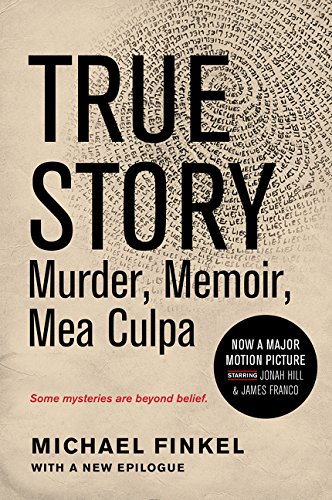I read True Story: Murder, Memoir, Mea Culpa after watching the movie version that came out in early 2015. The plot is certainly movie material. A disgraced New York Times reporter, Mike Finkel, and a suspected murderer of his entire family, Christian Longo, strike up an unusual relationship that starts shortly after Longo’s arrest and lasts long after his trial.
Finkel, in the memoir portion of the book, bluntly exposes his own folly in a story he wrote for the Times about slave labor on cocoa plantations in Africa. He reported his story through the eyes of one young man, when, in fact, his ‘voice’ was a composite of a number of men he interviewed. Finkel admits to having numerous opportunities to come clean about his lies before the story went to print. He didn’t.
When the truth came out, he was summarily fired by the Times. Finkel planned to go off the grid to his Montana home until after the dust settled, but in a stroke of karma, he took one last call. It was a reporter from the Portland Oregonian whom Finkel assumed was calling about his journalistic disgrace. He wasn’t. He was calling about the Longo murders about which Finkel knew nothing.
Why did the Oregonian reporter call Finkel? That’s part of the mystery. But as a result of that phone call, Finkel got access to Longo and began speaking with him regularly.
Longo agreed not to talk to other reporters and Finkel agreed to keep Longo abreast of any research he did outside of their discussions. Part of the book’s intrigue is the subliminal game of cat and mouse Longo and Finkel play with one another.
The trial portion of the story is extraordinary. Because of an inexplicable plea entered by Longo as it related to the murder of his wife and three children, he insisted on testifying to explain himself. This was over the vehement objection of both of his attorneys. So, for days on end, Longo testified in virtual narrative form – something rarely ever seen in a criminal trial. His testimony was essentially the entire defense and what he planned to say was anyone’s guess, including Finkel’s, who sat in the gallery listening.
Was Longo a sociopath? A psychopath? Very possibly. Finkel does an amazing job of systematically laying down the facts that slowly led up to Longo’s unraveling. The story of an arrogant man whose failures, some his own making and some due to circumstances beyond his control, became too much to bear.
No doubt there will be times during the book you will be disgusted by Longo, Finkel or both of them. But it was a story worth telling and a book worth reading. Finkel is able to humanize Longo, who we know from the start is likely a cold blooded killer, and make you wonder just how close any of us could get to that point of no return.
Published: 2005
Publisher: HarperCollins
Elizabeth's rating: 4
